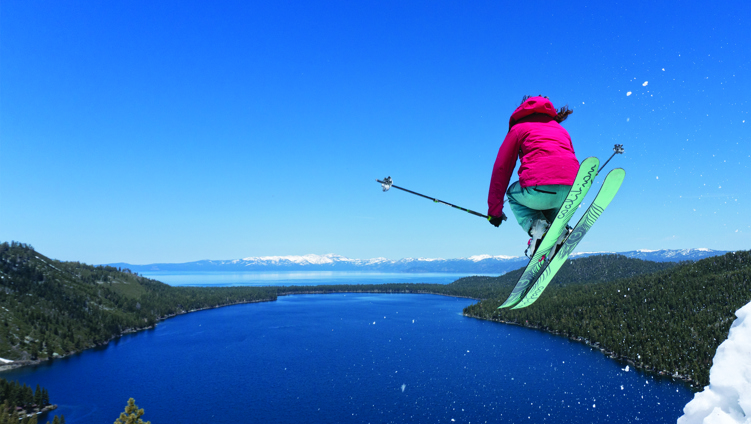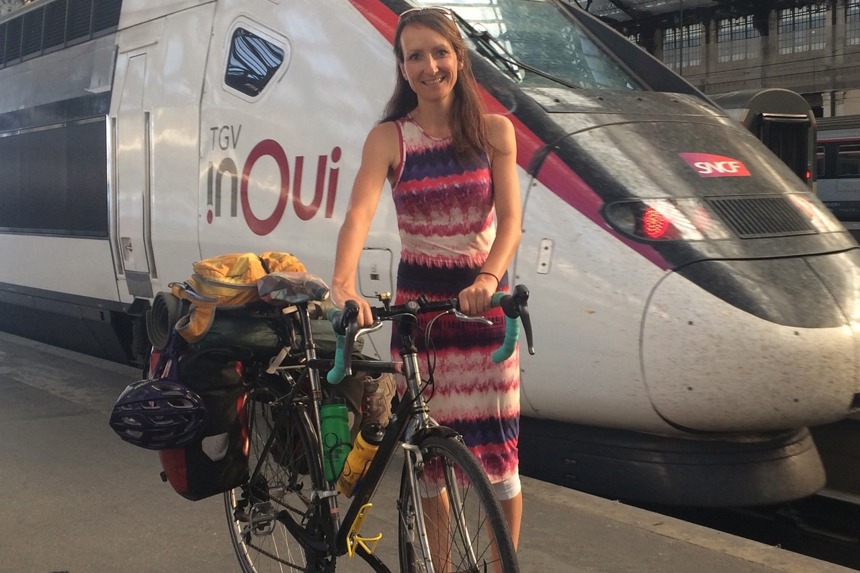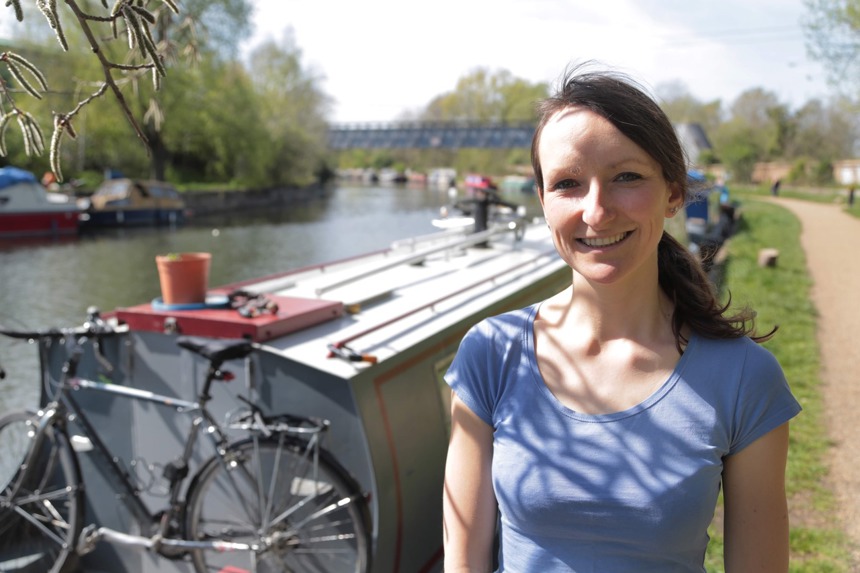We recently chatted to Anna Hughes, long-distance cyclist, author, environmental campaigner and director of Flight Free UK, Anna Hughes.

We recently chatted to Anna Hughes, long-distance cyclist, author, environmental campaigner and director of Flight Free UK, Anna Hughes.
A hot September day in 2019 found me swimming in the Mediterranean Sea at Nice, having just completed a 1000+km bike ride across France. For good measure, along the way I’d ridden up Mont Ventoux three times, joining Le Club des Cinglés du Ventoux (the ‘madmen’ of Ventoux). The pebbled beach plunged sharply into the water, the cool, salty waves crashing repeatedly against it and gripping me in their rise and fall as I trod water offshore. Below the surface my legs shook off all those miles into the clear depths, the endless blue stretching for miles along the Côte d’Azur.
The only thing to break the tranquility was every few minutes a plane taking off from Nice airport, the roar of the engines tearing into the sky directly above my head. I looked at the sunbathers on the beach as I bobbed in the depths. Most of them would have arrived by plane.

It’s over a decade since I last sat on a plane. All my lifestyle choices are about keeping my carbon footprint as low as possible – I’m vegan, I don’t drive, my home is powered by solar, my clothes come from charity shops – but such is the carbon impact of flying that all those savings could be wiped out with a single flight.
When I started making tentative steps into the world of adventuring, I worried that not flying would make me a bit boring. How could this desire to reduce my emissions be reconciled with my desire to travel and explore? So in 2011, I set off on my bicycle to cycle 4,000 miles around the coast of Britain. As well as avoiding a flight, it meant I wouldn’t be starting my life as an adventurer exploring another country when I knew so little about my own. After that I could start to travel the world, I decided.
But cycling around Britain showed me how much there is to discover right here, under our noses. The variety I found on the UK coastline was enough to fill several lifetimes of adventure, from the endless mountain-scapes in western Scotland which could rival the Alps or the Rockies, to the vast swathes of sand north of Aberdeen known locally as ‘the Sahara’, to the glittering turquoise sea in the secluded coves of Devon and Cornwall – as magical as any Thai beach.
Instead of making me feel as though I’d ‘done’ Britain, I became even more fascinated with our tiny island – and certain that flights are by no means an essential part of any adventure. The more I saw, the more I wanted to see, and if I fancied a change of scene, Europe would give me all the variety I would ever need.
My main motivation remained the environmental impact. For me, the five tonnes of carbon emissions (that’s per passenger, not for the whole plane) to fly to Australia to snorkel the Great Barrier Reef just isn’t worth it, especially when those emissions have a direct and detrimental effect on the coral I’ve come to see. A pilgrimage to Peru and Machu Picchu would add more than 2 tonnes of carbon to my footprint, and contribute to the erosion of that precious site. Fundamentally, that kind of carbon output doesn’t square up with the 2.3 tonnes that we've been told we shouldn’t exceed, annually, in order to keep global heating at ‘safe’ levels.
'Cycling around Britain showed me how much there is to discover right here, under our noses.'

As adventurers, we want to foster curious minds and inspire others to access the freedom and discovery that comes with travel. By exploring we learn as much about ourselves as we do about the world in which we live. But it gets difficult when the mode of unwrapping our fascinating planet contributes to its demise. We all feel a need to inspire others to be as passionate and excited about the natural world as we are – and for me, that means fighting to protect it.
As part of this fight, a couple of years ago I set up Flight Free UK – a campaign that asks people to take a year off flying. It’s about breaking a habit and inspiring longer-term behaviour change through a short-term challenge. For many people who have grown up in the era of cheap flights, air travel is normal, and the alternatives are forgotten about. But take air travel off the table, and we are forced to think about things in a more inventive and adventurous way. Because of course, not flying doesn’t mean not travelling. It just means travelling in a different, and arguably more enriching, way.
Behaviour change is difficult when structures are in place that keep us flying: a lack of tax on kerosene keeps aeroplane tickets artificially cheap (tax breaks to the aviation industry add up to the tune of £7bn per year – enough to slash rail tickets by two thirds if we were serious about investing in low-carbon travel). The fossil fuel lobby has a vested interest in keeping us in the air and is incredibly powerful when it comes to government influence – much like the tobacco industry successfully hid the health effects of smoking for many years. The aviation industry’s fight back against growing climate awareness includes leading consumers to believe that you can ‘fly carbon neutral’ (spoiler: you can’t). And the alternatives are often inaccessible – too expensive, or too difficult to book.
But we have a huge amount of power as consumers. As more and more people move away from air travel, industry responds by reinstating train routes or cancelling flight routes. This has already happened in Sweden, the birthplace of flygskam (flight shame), where there was a 9% drop in domestic air travel in 2019. The flight free movement is inspiring people across the globe to reduce the amount they fly or stop flying altogether. Flight Free UK is part of that social shift away from air travel.
Rather than cycling back from Nice I took the train: a journey of nine hours door to door, which is not too far off the flight time when you’ve added check-in, baggage claim and transfers. My precious bike sat in its bag on the luggage rack in clear view for the whole journey – no worries about bent chain rings and snapped forks. The whole of France unfolded out of the window, my adventure in reverse rather than a quick bump back to earth. Quite apart from the carbon saving (6kg CO2 by train as opposed to 163kg by plane), it was a geography lesson, a relaxed conclusion to the adventure, and gave me a significant understanding of my place in the world. You can’t say more adventurous than that.
'The aviation industry’s fight back against growing climate awareness includes leading consumers to believe that you can ‘fly carbon neutral’ (spoiler: you can’t).'

